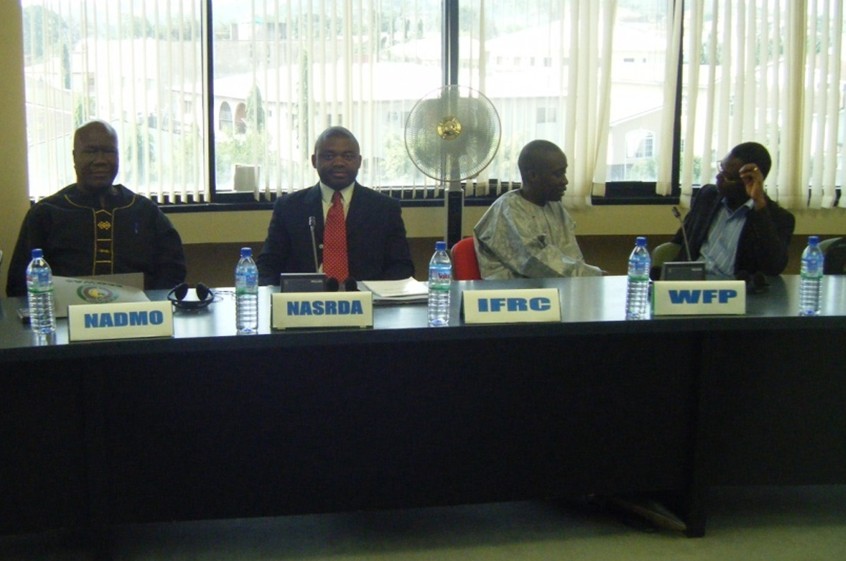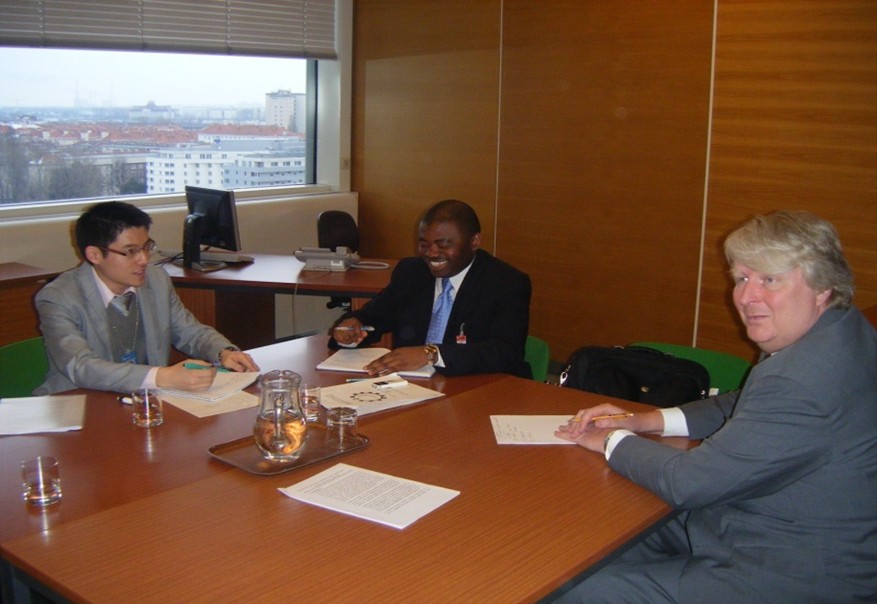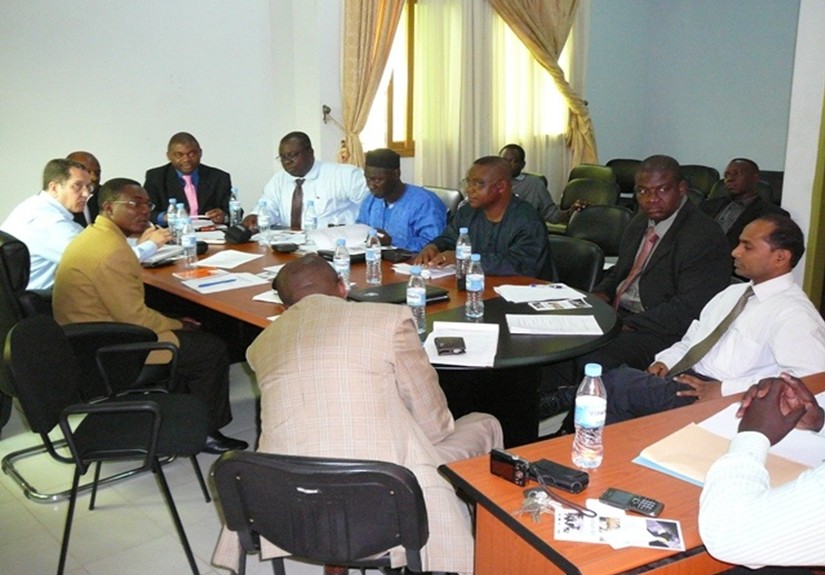Godstime K. James and Halilu A. Shaba, UN-SPIDER Regional Support Office in Nigeria, Space Applications Department, National Space Research and Development Agency, Abuja, Nigeria.
Introduction
Disasters have been around for a while, dating back to the early human civilization. According to Niekerk (2007), some of the earliest contributions to the field of disaster science were from Carr (1932), Sorokin (1942), Eldenman (1952), Quarantelli (1954 and 1957), Moore (1956), Fritz and Williams (1957), Drabek and Quarantelli (1967), Doughty (1971), Hewitt and Burton (1971), Kreps (1973), Westgate and O'Keefe (1976), Jager (1977), Torry (1978), and Turner (1978). Today, natural and human induced disasters have continued to claim lives and properties in different parts of the world. While naturally induced disasters such as earthquakes, tsunamis, hurricanes, and landslides are driven by natural processes, human induced disasters such as oil spills, air pollution, chemical and biological disasters are caused by anthropogenic activities.
It is of course possible to manage disasters by (i) minimizing potential risks through the development of disaster early warning strategies, (ii) preparing developmental plans to provide resilience to such disasters, (iii) mobilizing resources including communication and e-health services and (iv) helping in rehabilitation and post-disaster reconstruction (Jayaraman et al., 1997). In addition, studies have shown that natural and human induced disasters transcend geographic boundaries. For example, the 2004 Tsunami in South-East Asia affected Indonesia, India, Malaysia, Myanmar, Sri Lanka, Somalia, and Thailand. Furthermore, the effects of disasters are more pronounced among the poor in developing countries. 94.25% of all people killed by disasters from 1975 to 2000 were low income or lower-middle income earners (Briceño, 2008). Consequently, in its resolution 61/110 in 2006, the United Nations General Assembly decided to establish the programme “Platform for Space-based Information for Disaster Management and Emergency Response” (UN-SPIDER), to provide universal access to all countries (especially developing countries) and relevant international and regional organizations to space-based information and services relevant to the full disaster management cycle.
The Regional Support Office in Nigeria
The UN-SPIDER Regional Support Offices (RSO) constitute one of the organizational frameworks for the implementation of UN-SPIDER activities. One of the reasons for adopting a regional organizational framework is to harness regional strengths in space based disaster management and emergency response. The UN-SPIDER Regional Support Office in Nigeria is hosted in the National Space Research and Development Agency (NASRDA), Abuja, Nigeria. It was established in 2008 through an agreement between NASRDA (Nigeria) and the United Nations Office for Outer Space Affairs (UNOOSA)
Activities of the Regional Support Office in Nigeria in 2009
The activities of the RSO for 2009 were focused on the implementation of the work plan approved by the United Nations General Assembly for the biennium 2008-2009 (A/AC.105/929). They include: systematic compilation of all available relevant information; ensuring that relevant information is easily accessible and disseminated to all interested end-users; awareness-raising; outreach activities; support to national activities; support to the establishment of national disaster management planning and policies; and support to capacity-building.
Ensuring that relevant information is easily accessible and disseminated to all interested end-users
One of the fastest means of information accessibility and dissemination is through the web. As a result, the RSO developed a web portal for information dissemination (www.unspider-ng.net). The web contents include: functions and goals of the RSO; contact details for staffs of the RSO; links to other UN-SPIDER websites; information on upcoming UN-SPIDER events; provisions for building community of practice using blogging mechanism; links to capacity development sites for capacity development in space technology in Africa; links to relevant stakeholders in disaster management and emergency response in Africa.
Awareness-Raising
The successful implementation of the UN-SPIDER programme is based on the successful creation of programme awareness. The goal of the awareness-raising efforts is two-folds; first, to educate disaster managers on the role of space technology in the management of the entire disaster cycle, and second, to show the various sources of such space-based technology. Consequently, the RSO participated in the workshop for ECOWAS disaster risk reduction working group organized by the ECOWAS commission in Abuja from March 18th to 19th 2009. During the workshop, the RSO representative (Dr. Godstime James) met with the representatives from the disaster risk reduction offices in Ghana, Togo, Senegal, Cote d’Ivoire and Cape Verde. The representatives were briefed on the activities of the RSO (Figure 1). One of the spin-offs from the awareness campaign was the invitation from the Government of Togo to UN-SPIDER for a Technical Advisory Mission (TAM).

Figure 1. (L-R). Mr. Ebenezer Portuphy (National Coordinator, NADMO, Ghana), Dr. Godstime James (Manager, UN-SPIDER, NASRDA), Mr. Amadou Ndiaye (Programme Coordinator, National RRC, Senegal), and Mr. Hounkpe Koffi (Focal Point for DRR Togo) during the ECOWAS DRR meeting in Abuja.
Outreach Activities
An outreach activity is the platform within which the UN-SPIDER programme facilitates the participation of disaster managers and space-based information service providers in the activities of UN-SPIDER or its affiliates. As a result, within the framework of the outreach activities, the RSO was involved in the following outreach programmes:
Development of MOU with ECOWAS
The Economic Community for West African States (ECOWAS) plays a major role as a link to West African countries for disaster risk reduction and management. In recognition of the contribution of the RSO to disaster management within the ECOWAS sub-region, representatives of the ECOWAS commission, Abuja, visited the RSO on the 25th of February 2009. The visitors initiated the development of a Memorandum of Understanding (MOU) between NASRDA and ECOWAS to facilitate joint outreach activities in disaster management within the region. A draft of the MOU has been prepared by NASRDA, vetted by the legal department of NASRDA and sent to ECOWAS for inputs. The final version of the MOU will be signed by the Director General/Chief Executive of NASRDA and the President of the ECOWAS commission in Abuja.
Participation in UN-SPIDER workshops and meetings
For proper coordination of UN-SPIDER activities in the regional support offices, the UN-SPIDER staff in Vienna and Bonn organizes a series of meetings and workshops. The RSO participated in the “UN-SPIDER Stakeholders Meeting”, held in Vienna from 10th to 11th February 2009 (Figure 2).

Figure 2. (L-R). Mr. Tony Young Lyu (UN-SPIDER-Vienna), Dr. Godstime James, (Manager, RSO-Nigeria), and Mr. David Stevens (Coordinator, UN-SPIDER-Vienna) during the presentation of the 2009 RSO-Nigeria activities in Vienna.
Similarly, the RSO participated in the Third United Nations International UN-SPIDER Bonn Workshop titled "Disaster Management and Space Technology - Bridging the Gap", held in Bonn, Germany from 21st to 23rd of October 2009. During the workshop, the RSO representative presented a paper documenting the role of Telemedicine in Disaster Management in Nigeria.
Participation in the International Charter: Space and Major Disasters Authorised User Training
One of the sources of satellite data for disaster management and emergency response is the International Charter: Space and Major Disasters (Charter). The goal of the Charter is to provide a unified system of space data acquisition and delivery to those affected by natural or man-made disasters through Authorized Users. Consequently, the Charter Authorised User Training was organized by the Disaster Monitoring Constellation international imaging (DMCii), Limited in collaboration with the Nigerian National Emergency Management Agency (NEMA) in Abuja. The RSO (represented by Mr. Zubair Opeyemi) participated in the workshop from the 25th to 26th of March, 2009.
Support to National Activities
The National Focal Point (NFP) is the primary contact of the UN-SPIDER Programme. An NFP is a national institution, nominated by the Government of the respective country, representing the disaster management and space application communities (A/AC.105/929). The primary role of NFPs is to work with UN-SPIDER to strengthen national disaster management planning and policies and implement specific national activities that incorporate space-based technology solutions in support of disaster management and emergency response. One of the efforts by the RSO to promote the establishment of NFPs has been to reach out to the countries in the West African region and encourage them to consider identifying an NFP in their country. For example, the National Emergency Management Agency in Nigeria was encouraged to become an NFP for Nigeria. Similarly, Togo and Cameroon were encouraged to also nominate one.
Capacity Building
Capacity development is a major requirement for the optimum utilization of space-based information for disaster management and emergency response. Similarly, the acquisition, processing and transfer of knowledge in space applications for disaster management is essential for the success of UN-SPIDER. Hence, the RSO is currently compiling available resources for capacity development in space applications for disaster management. This is an ongoing process and a list of relevant training institutions are posted on the RSO website. Similarly, the RSO will soon commence with the development of e-learning modules for disaster management using space technology, for integration in the RSO portal.
Support to the establishment of national disaster management planning and policies
The implementation of space-based approach to disaster management is facilitated through the initiation of appropriate planning and policies. Therefore, one of the approaches adopted by UN-SPIDER is technical advisory support to countries that request such support. UN-SPIDER has conducted technical advisory missions to Burkina Faso, Ghana, Namibia and Togo. The RSO supported the Togo mission (Figure 3).

Figure 3. Consultative meeting between TAM team and Local Organizers in Lome, Togo.
Activities of the Regional Support Office in Nigeria in 2010
The activities of the RSO for 2010 are derived from the work plan approved by the United Nations General Assembly for the biennium 2010-2011 documented in A/AC.105/937. The activities implemented are awareness-raising, outreach activities, capacity development, cooperation, knowledge management and transfer, knowledge portal development, support at the national level.
Awareness-Raising
Two major activities were scheduled for 2010. The first was the updating of the RSO website (www.unspider-ng.net) with a Regional Knowledge Portal (RKP). The development of the knowledge portal is a continuous effort. The goal for developing the knowledge portal is to disseminate information on the management of the full disaster cycle using space technology. A segment of the knowledge portal will be dedicated to the exchange of ideas as well as reach-out to the community of practitioners in disaster management. The knowledge portal will consist of news feeds on disaster management, case studies showcasing how space technology was applied in addressing disaster management in Africa, information on access to free space-based data for disaster management (e.g. procedures for invoking the Charter), and links to e-learning tools.
Participation in conferences and space related events is also envisaged. The RSO plans a major awareness-raising event for the 8th Session of the African Association for Remote Sensing of the Environment in Addis Ababa slated for October 25th to 29th 2010.
Outreach Activities
Within the scope of outreach activities, the RSO participated in the following events organised by UN-SPIDER: UN-SPIDER meeting in Vienna from 9th to 12th of February 2010; and Regional Workshop "Building Upon Regional Space-based Solutions for Disaster Management and Emergency Response for Africa, Addis Ababa, Ethiopia, from 6th to 9th July 2010; Fourth United Nations International UN-SPIDER Bonn Workshop on Disaster Management and Space Technology: “The 4C – Challenge: Communication – Coordination – Cooperation – Capacity Development”, Bonn, Germany, from 12th to 14th October 2010.
Capacity Building
Capacity development is a critical component of the activities of the RSO for 2010. As a result, the RSO participated in the following capacity development activities: project Management Training Course for the Charter organised by NEMA and facilitated by DMCii and United States Geological Survey from the 9th to 11th of February 2010; mock activation exercise for Charter on 19th May 2010; course on SARTrix High and Medium Resolution TerraSAR-X Imagery Analysis from June 7th to 18th 2010 organized by NASRDA and facilitated by Terra SAR X Services and Infoterra (an EADS Astrium Company).
Platform for Ensuring Cooperation
A major cooperation for 2010 is between the RSO and NEMA during disaster response activities in Nigeria. In particular, the RSO visited the site of the extensive flooding in Northern Nigeria in September 2010. Following the flood disaster, NEMA activated the Charter. Consequently, the RSO collaborated with NEMA for the processing of the radar image provided during the Charter activation.
Support at the National Level
The RSO provided support to NEMA for the review of the draft Nigerian National Disaster Management Framework. In particular, the RSO recommended the inclusion of space-based approach to disaster management. In addition, the RSO participated in the review of methods for Flood Mapping in Nigeria. Finally, the RSO facilitated the enlisting of NEMA as the UN-SPIDER National Focal Point for Nigeria.
Conclusion
Space-based approach to disaster management is still at its infancy stage. However, application cases have shown that the approach is efficient and cost effective, most especially when a large area is concerned. UN-SPIDER is creating the much-needed awareness on what can be done from space when managing disasters. One of the frameworks for achieving this goal is the use of regional support offices. Although the regional support office in Nigeria was established in 2008, it had tremendous achievements. Some of the achievements include support for technical advisory missions, development of an operational office, participation in outreach activities, awareness-raising, and ensuring that relevant space-based information for disaster management and emergency response is easily accessible and disseminated to all interested end-users.
References
- A/AC.105/929. Report on activities carried out in 2008 in the framework of the United Nations Platform for Space-based Information for Disaster Management and Emergency Response. Committee on the Peaceful Uses of Outer Space, United Nations General Assembly, 14th January 2009.
- A/AC.105/937. United Nations Platform for Space-based Information for Disaster Management and Emergency Response: Workplan for the biennium 2010-2011. United Nations General Assembly, 27 April 2009.
- Briceño, Sálvano 2008. Linking Disaster Risk Reduction and Poverty Reduction. Good Practices and Lessons Learned. A Publication of the Global Network of NGOs for Disaster Risk Reduction. URL: http://www.unisdr.org/eng/about_isdr/isdr-publications/14_Linking_Disaster_Risk_Reduction_Poverty_Reduction/Linking_Disaster_Risk_Reduction_Poverty_Reduction.pdf
- Carr, L.J. 1932. Disasters and the Sequence-Pattern Concept of Social Change. American Journal of Sociology 38, Pp. 207-218.
- Drabek, T.E. 1991. The Evolution of Emergency Management. In Drabek, T.E. and Hoetmer, G.J. (Eds.), Emergency Management: Principles and Practice for Local Government, ICMA, Washington DC, Pp. 3-29.
- Drabek, T.E. and Quarantelli, E.L. 1967. Scapegoats, villains and disasters. Transaction 4. Pp. 12-17.
- Doughty, P. 1971. From disaster to development. Americas 23. Pp. 23-35.
- Eldenman, R. 1952. An approach to the study of disaster. (unpublished paper).
- Fritz, C. and Williams, H. 1957. The human being in disasters: a research perspective. Annals 309. Pp. 42-51.
- Hewitt, K. and Burton, I. 1971. The hazardousness of a place: a regional ecology of damaging events. Toronto: University of Toronto University Press.
- Jager, W. 1977. Katastrophe und Gesellschaft: Gundlegungen und Kritik von Modellen der Katastrophensoziologie. Darmstadt: Luchterhand.
- Jayaraman V., M. G. Chandrasekhar and U. R. Rao 1997. Managing the natural disasters from space technology inputs. Acta Astronautica, 40 (2-8), Pp. 291-325.
- Kreps, G. 1973. Decision making under conditions of uncertainty: Civil disturbance and organizational change in urban police and fire departments. Newark: Disaster Research Centre, University of Delaware.
- Moore, H. 1956. Towards a theory of disaster. American Sociological Review 21. Pp. 734-737.
- Niekerk, Dewald Van 2007. Disaster Risk Reduction, Disaster Risk Management and Disaster Management: Academic Rhetoric or Practical Reality? Journal of the Disaster Management Institute of Southern Africa, 4(1), Pp. 6-9.
- Quarantelli, E.L. 1954. The nature and conditions of panic. American Journal of Sociology 60. Pp. 267-275.
- Quarantelli, E.L. 1957. The behaviour of panic participants. Sociology and Social Research 41. Pp. 187-194.
- Quarantelli, E.L. (Ed.). 1998. What is a disaster? Perspectives on the question. London: Routledge.
- Sorokin, P. A. 1942. Man and Society in Calamity: The Effects of War, Revolution, Famine, Pestilence upon Human Mind. New York: Dutton.
- Torry, W. 1978. Natural disasters, Social structures ad changes in traditional societies. Journal of Asian and African Studies 13. Pp. 167-183.
- Turner, B. 1978. Man-made disasters. London: Wykeham.
- Westgate, K.N. and O'keefe, P. 1976. Some definitions of disaster. Bradford: Disaster Research Institute, University of Bradford.
Contact
Godstime James
Email: godstimej [at] gmail.com
